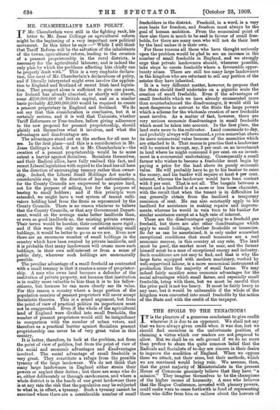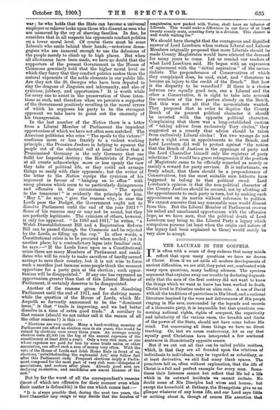THE SPOILS TO THE TENACIOUS!
IT is the pleasure of a generous combatant to give credit wherever it is duo to an opponent. We shall not say that we have always given credit when it was due, lest we should find ourselves in the unfortunate position of claiming a virtue which our readers are not prepared to allow. But we shall be on safe ground if we do no more than profess to share the quite common belief that the Radicals and Socialists of to-day are sincere in their desire to improve the condition of England. When we oppose them we attack, not their aims, but their methods, which we are convinced would bring ruin. We assume, then, that the great majority of Ministerialists in the present House of Commons genuinely believe that they have "a mission." They imagine themselves to be the champions of the higher causes of humanity A man who believes that the Hague Conference, invested with plenary powers, could make wars to cease forthwith is fond of representing those who differ from him as callous about the horrors of war ; he who holds that the State can become a universal employer or reliever looks upon those who dissent as men who are unmoved by the cry of starving families. In fine, he considers that in all respects his opponents conduct politics on a lower moral level. Of course there must be some Liberals who smile behind their hands,—notorious dema- gogues who are immoral enough to use the delusions of the people merely to climb up to high places. But when all allowances have been made, we have no doubt that the supporters of the present Government in the House of Commons genuinely hold that the higher moral level on which they fancy that they conduct politics makes them the natural exponents of the noble elements in our public life. Are they not the St. Georges who have been deputed to slay the dragons of Jingoism and inhumanity, and also of cynicism, jobbery, and opportunism ? It is worth while for every one to assist in the preservation of these inten- tions as such, and therefore when we perceive a supporter of the Government positively revelling in the moral errors of which he supposes his party to be the strongest opponent we take leave to point out the enormity of his transgression.
In the last number of the Nation there is a letter from a Liberal Member of Parliament the impudent opportunism of which we have not often seen matched. The American politician who cries "The spoils to the victors!" confesses more or less frankly to a violent working 'principle ; the Prussian Junkers in helping to squeeze the people out of the electoral roll at least believe that a -Prussianised Germany is the only Germany that can • fulfil her Imperial destiny; the R,otativists of Portugal at all events acknowledge more or less openly the view they take of political life, or they could not arrange things so easily with their opponents ; but the writer of the letter to the Nation equips the cynicism of his argument in favour of "hanging on to office" with smug phrases which seem to us particularly disingenuous and offensive in the circumstances. "The spoils to the tenacious ! " is evidently the principle for him. May I," he says, "give the reasons why, in case the Lords pass the Budget, the Government ought not to dissolve Parliament until the end of the year 1911 ? " Some of his reasons may or may not be sound, but they are perfectly legitimate. The cynicism of others, however, is only too apparent. "In 1910 and 1911," he writes, "a Welsh Disestablishment Bill and a Registration Reform Bill can be passed through the Commons and be rejected by the Lords, so filling up the cup." In other words, a Constitutional crisis is to be procured when needed ; yet in another place, by a contradictory lapse into familiar cant, he says :—" If the Lords force upon us a Constitutional crisis there are many Members of Parliament and candi- dates who will be ready to make sacrifices of hardly earned • savings to save their country, but it is not wise to force such a sacrifice just because some people think the moment opportune for a party gain at the election • such oppor- tunism will be disappointed." If any one hat; expressed an opportunism greater than that of this Liberal Member of Parliament, it certainly deserves to be disappointed.
Another of the reasons given for not dissolving Parliament until the end of 1911, and for shelving mean- while the question of the House of Lords, which Mr. Asquith so fervently announced to be the "dominant issue," is that "trade is improving, and we had better dissolve in a time of extra good trade." A corollary to that reason (should we not rather call it the reason of all the other reasons ?) is this :—
"Elections are very costly. Many a hard-working member of Parliament can afford an election once in six years, who would be ruined by elections once every three years. An average county election costs .21,500 (on the top of the annual expenses of the _constituency at least .2500 a year). Only a very rich man, or one whose expenses are paid for him by some trade union or other association, can afford such a sum of money very often. With the veto of the House of Lords and Irish Home Buie in front of us, elections, 'notwithstanding the septennial Act,' may follow fast after this Parliament ends. Frequent elections imply a Parlia- ment composed for the most part of very rich men—delegates of associations, and seekers after place. Already good men are declining re-election, and candidates are scarce because of the cost."
But by far the worst of all the correspondent's reasons (most of which are offensive for their manner even when their matter is defensible) is the one which comes last :— "It is always possible that, during the next two years, the Lord Chancellor may resign or may decide that the benches of
magistrates, now packed with Tories, shall have an infusion of Liberals. This would make a difference in our favor of at least twenty county seats, counting forty ins division. This chance is well worth waiting for."
We should have thought that the courageous and dignified answer of Lord Loreburn when certain Liberal and Labour Members originally proposed that more Liberals should be made County Magistrates would have silenced the demand for many years to come. Let us remind our readers of what Lord Loreburn said. He began with an expression of agreement with the "initial aspiration" of the memo- rialists. The preponderance of Conservatives of which they complained does, he said, exist, and "threatens to become an injury to the credit of the Bench." But how is the disparity to be remedied? If there is a choice between two equally good men, one a Liberal and the other a Conservative, it is right to take into account the numbers of the two parties already on the Bench. But this was not all that the memorialists wanted. They proposed that in order to deprive the County Bench of its present political character it should be invested with the opposite political character. Complaining that there was a long-established custom of "taking advice from exclusively Tory circles," they suggested as a remedy that advice should be taken from exclusively Liberal circles ! Yet two wrongs do not make a right even in appointments to the Bench, and Lord Loreburn did well to protest against "the notion that the Bench of Justices is the appanage of party and the Lord Chancellor himself only the registrar of party selections." It would be a grave retrogression if the position of Magistrate came to be officially regarded as merely or mainly a reward for party services. It is unfortunate, we freely admit, that there should be a preponderance of Conservatives, but the most suitable men hitherto have happened to belong to that political creed. Lord Loreburn's opinion is that the non-political character of the County Justices should be secured, not by allotting all the appointments to each party in turn, but by making each appointment on its merits without reference to politics. We cannot conceive that any reasonable man would dissent from this. But the Liberal Member of Parliament crowns his naked and unashamed opportunism with the offensive hope, as we have seen, that the political death of Lord Loreburn may bring to the Liberal Party a, legacy which scrupulous persons (at least when the origin and nature of the legacy had been explained to them) would surely be very slow to accept.











































 Previous page
Previous page